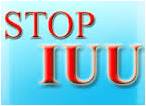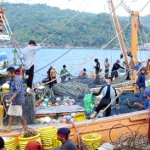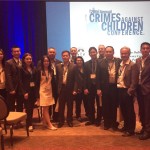
The cabinet of Prime Minister Prayut Chan-o-cha approved a raft of laws and measures last week to combat illegal, unregulated and unreported (IUU) fishing, and create a fishing and seafood industry that will be sustainable and protect the country’s valuable marine resources while also preserving the livelihoods of those who fish responsibly.
The measures include versions of laws and regulations put in place earlier this year that have been enhanced to close loopholes, and new legislation and management plans. Among them were a Royal Ordinance on Fisheries, the Marine Fisheries Management Plan, and the National Plan of Action to Prevent, Deter and Eliminate IUU Fishing.
“The new legislation amounts to a fundamental reform of the legal framework governing Thai fisheries. Taken together, [they] mark a milestone in Thailand’s effort to reform its fisheries in line with international standards,’’ said the Ministry of Foreign Affairs.
The action and management plans outline key objectives and principles to oversee Thailand’s new fisheries policy. New laws empower authorities to drive the policy and implement fisheries regulations. They introduce proportionate and deterrent sanctions to combat IUU fishing and trafficking in persons in the fisheries sector.
In addition, the head of the government’s recently created Command Center for Combatting Illegal Fishing said the Center is in the process of drafting 39 new laws to support the Cabinet’s efforts to end IUU fishing and they will be unveiled soon.
In April, the European Union issued Thailand a “yellow card” or warning that it must clean up abuses and violations in its fisheries or the Kingdom’s seafood products could be banned from being exported to Europe. Thailand’s seafood industry brings in roughly $7 billion in export earnings each year, but problems associated with rapid and unregulated growth in the industry had not yet been solved by previous governments.
In response to the warning by the European Union, the current Thai government has been taking systematic and comprehensive action to stop and prevent IUU fishing. It has also been waging a vigorous campaign to stop human trafficking. The fishing industry, and not just in Thailand, is one industry where reports of human trafficking and labor abuse have been fairly frequent.
Prime Minister Prayut has acknowledged that IUU fishing is linked to trafficking in persons and forced labor in the fisheries sector. He stated that all actors, including government officials, business owners and workers, need to improve their efforts to fight trafficking in persons and crack down on trafficking networks.
In recent months, Thai courts have issued arrest warrants for over 200 trafficking suspects. Thousands of ships that have not followed the new regulations have been barred from leaving ports.
The government said that implementing all the measures so they are truly effective will take some time, and acknowledged that challenges still remain. The authorities are working to improve Thailand’s seafood traceability system the effectiveness of its catch certification system. The government is determined to safeguard “the confidence of global consumers in Thai fisheries products,’’ the Ministry said.
*****************
Thailand Focus week of November 9, 2015
For more information and updates about Thailand’s policies and actions against trafficking in persons and related issues, visit www.thaianti-humantraffickingaction.org




